Lowering cholesterol naturally: vital mushrooms provide effective support
When it comes to health, everyone talks about cholesterol. But what exactly is cholesterol? And why do we distinguish between “good” and “bad” cholesterol? And how can vital mushrooms lower elevated cholesterol levels naturally and gently?
What is cholesterol?
The term “cholesterol” derives from the Greek and its discovery in gallstones. Translated into English, it is composed of the words “bile” and “solid”. Gallstones can form when there is too much cholesterol in the bile in relation to the bile acids. Cholesterol is a fat-like substance that belongs to the group of sterols and is found predominantly in human and animal organisms.
What is cholesterol needed for?
Cholesterol is vital for our entire body. 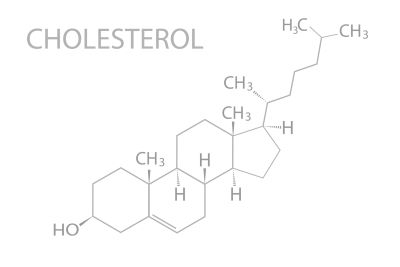 It can be partly produced by most cells themselves. However, a large part is produced by the liver and distributed to the cells via the bloodstream. The cells have special receptors for the uptake of cholesterol. The brain produces its own cholesterol, which is needed there, for example, for the nerve sheathing and for the formation of messenger substances and hormones. Cholesterol is also involved in building the cell membrane. However, too much cholesterol in the cell can have a toxic effect, which is why the cells need fine regulatory mechanisms.
It can be partly produced by most cells themselves. However, a large part is produced by the liver and distributed to the cells via the bloodstream. The cells have special receptors for the uptake of cholesterol. The brain produces its own cholesterol, which is needed there, for example, for the nerve sheathing and for the formation of messenger substances and hormones. Cholesterol is also involved in building the cell membrane. However, too much cholesterol in the cell can have a toxic effect, which is why the cells need fine regulatory mechanisms.
Cholesterol is a polycyclic alcohol and belongs to the lipids
It is not water-soluble and therefore initially not transportable in the blood. It only becomes transportable by binding to a protein. 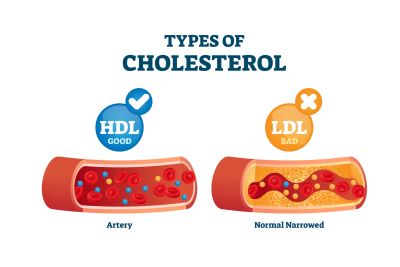 HDL and LDL are therefore not pure cholesterol, but transport substances consisting of fat-like substances and protein, i.e. lipoproteins. They have the ability to absorb lipids and make them transportable. For example, cholesterol or triglycerides. There are different compositions here, so depending on the density, one speaks of a high-density lipoprotein cholesterol = HDL and a low-density lipoprotein cholesterol = LDL.
HDL and LDL are therefore not pure cholesterol, but transport substances consisting of fat-like substances and protein, i.e. lipoproteins. They have the ability to absorb lipids and make them transportable. For example, cholesterol or triglycerides. There are different compositions here, so depending on the density, one speaks of a high-density lipoprotein cholesterol = HDL and a low-density lipoprotein cholesterol = LDL.
High-density lipoprotein cholesterol = HDL
HDL is considered anti-inflammatory as well as antioxidant by helping to prevent the harmful oxidation of lipids. Due to the transport of cholesterol out of the arteries, HDL plays an important role in arterial health. It promotes the efflux of cholesterol from the cell, takes up the cholesterol absorbed from the diet and the cholesterol shed from the cells and transports it to the liver. The liver in turn uses the cholesterol mainly for the formation of bile acids, these are important for fat digestion and are partly reabsorbed from the intestine.
Low-density lipoprotein cholesterol = LDL
The LDL lipoprotein takes up the cholesterol produced by the liver and feeds it to the quadrillions of our cells. Here, cholesterol has a variety of tasks. For example, it is a component of the cell membrane, is needed for hormone and vitamin D production and is involved in the regulation of the immune system.
What cholesterol levels are normal?
The so-called standard cholesterol value is an average value based on the total population and also depends on age. This is why different countries have different standard values. Apart from age, genetics can also have an influence on cholesterol levels. However, so-called familial hypercholesterolaemia is rare. It only occurs in about one in 500 of those affected and already shows up in young people in the form of strongly elevated LDL values. More often, the cause is to be found in lifestyle, which also has an influence on cholesterol levels. In Germany, values up to 200mg/dl total cholesterol are considered normal. Most important, however, is the ratio of LDL to HDL, which should be below 3 or even 2.5. Ideally, the LDL value should not exceed 110mg/dl and the HDL value should not exceed 90mg/dl. HDL used to be called the “good cholesterol” because it clears the arteries of cholesterol. In the meantime, however, it is known that too high values here are also associated with an increased risk of arteriosclerosis.
Are there also cholesterol levels that are too low?
Total cholesterol values below 130 are rare and not necessarily a cause for concern. However, they can indicate thyroid diseases, advanced cancers, liver or intestinal inflammations as well as bile acid reabsorption disorders.
Values too high – hypercholesterolaemia
Elevated cholesterol levels are diagnosed much more frequently than those that are too low. Here, hereditary receptor deficiency is a rather rare cause. In most cases, an unhealthy lifestyle, characterised by a lack of exercise, an unfavourable diet and stress, is the cause. Smoking, kidney or thyroid diseases, inflammation or medication can also be involved. Elevated cholesterol levels are associated with an increased risk of arteriosclerosis, high blood pressure, heart attacks and strokes and should therefore always be taken seriously. Excessive cholesterol levels often occur in people with metabolic syndrome, i.e. a combination of elevated blood lipids with obesity, (pre)diabetes and high blood pressure.
Health risk cholesterol
Cardiovascular diseases – cause of death number 1
Every year in Germany alone,  around 350,000 people die from diseases such as heart attacks, strokes, arrhythmias and high blood pressure. This means that by now every third death in Germany is due to these causes. This also shows the immense importance of healthy blood circulation and oxygen supply. Arteriosclerosis is often caused by oxidative stress, which in turn can be triggered by overeating, malnutrition, smoking or inflammation. In this metabolic situation, harmful oxidised LDL is produced, which must be taken up by macrophages and represents an important mechanism in vasoconstriction/arteriosclerosis.
around 350,000 people die from diseases such as heart attacks, strokes, arrhythmias and high blood pressure. This means that by now every third death in Germany is due to these causes. This also shows the immense importance of healthy blood circulation and oxygen supply. Arteriosclerosis is often caused by oxidative stress, which in turn can be triggered by overeating, malnutrition, smoking or inflammation. In this metabolic situation, harmful oxidised LDL is produced, which must be taken up by macrophages and represents an important mechanism in vasoconstriction/arteriosclerosis.
An important vital mushroom for heart health and oxygen supply is the famous reishi. At the same time, it has an anti-inflammatory effect and is rich in antioxidants, thus counteracting the development of arteriosclerosis. It has a lowering effect on high blood pressure and is therefore therapeutically important for all cardiovascular diseases.
Another important mushroom against elevated cholesterol levels, arteriosclerosis and high blood pressure is Auricularia. Its vasodilating and anti-inflammatory properties perfectly complement the reishi. In addition, it can help prevent blood clots by making it more difficult for platelets to clump together. The third significant vital mushroom against arteriosclerosis is the shiitake. Similar to Auricularia and Reishi, it can help reduce plaques in the vessels and prevent new ones. In addition, like reishi, it supports a healthy liver metabolism.
Do elevated cholesterol levels increase the risk of cancer?
Cancer cells need numerous substances for their growth; among them is cholesterol. Studies show that elevated cholesterol levels in men are associated with an increased risk of prostate cancer. Conversely, low cholesterol levels also correspond to a low risk of prostate cancer. Here, the metabolic situation could be a decisive factor, because cholesterol levels rise both in chronic inflammatory processes – for example, in metabolic syndrome – and in oxidative stress. This could also explain the connection between high cholesterol levels and an increased risk of cancer. After all, inflammation, obesity and oxidative stress are cancer-promoting, while cholesterol-lowering drugs and measures as well as a healthy diet often reduce the risk of cancer. A great deal can also be achieved here by taking vital mushrooms, as many of them have anti-inflammatory and antioxidant effects. They can also be used prophylactically.
Causes of elevated cholesterol levels
Bad diet
An unfavourable diet is one of the main causes of elevated cholesterol levels. Accordingly, the right diet is one of the levels at which one can and must counteract elevated cholesterol levels. 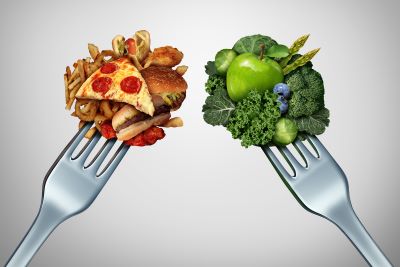 Animal or saturated fats should only make up a small part of the diet and polyunsaturated fats such as those found in nuts, flaxseed and mushrooms the larger part. Also avoid sugar, alcohol and fried or highly processed foods as much as possible. Since our intestinal flora and digestion also play an important role, as does cholesterol absorption from the intestines, foods rich in fibre are of immense importance. Unfortunately, however, hardly anyone eats enough of them. Fibre is found in vegetables, legumes, lettuce, whole grains, fruit and mushrooms. These foods also have an anti-inflammatory effect and are rich in antioxidants. They thus have a multiple effect on cholesterol levels.
Animal or saturated fats should only make up a small part of the diet and polyunsaturated fats such as those found in nuts, flaxseed and mushrooms the larger part. Also avoid sugar, alcohol and fried or highly processed foods as much as possible. Since our intestinal flora and digestion also play an important role, as does cholesterol absorption from the intestines, foods rich in fibre are of immense importance. Unfortunately, however, hardly anyone eats enough of them. Fibre is found in vegetables, legumes, lettuce, whole grains, fruit and mushrooms. These foods also have an anti-inflammatory effect and are rich in antioxidants. They thus have a multiple effect on cholesterol levels.
Change diet: Inclusion of fibre, bitter substances and antioxidants is important
An appropriate change in diet with the inclusion of individually selected vital mushrooms, depending on the risk factors, can often lead to normal blood lipid values with regard to triglycerides and cholesterol within a short time. Ideally, bitter substances or bitter herbs should also be supplemented in small quantities with every meal. This is significant because it stimulates the flow of bile and supports liver metabolism.
Diseases of the thyroid gland or kidney as cause
Diseases of the thyroid gland or kidney can also promote elevated cholesterol levels. To promote thyroid health, the vital mushrooms ABM, Cordyceps and Reishi have proven themselves; for kidney health, Cordyceps is an excellent recommendation. If increased cholesterol levels occur during the menopause, the two vital mushrooms Cordyceps and Reishi are also recommended.
Stress can also drive up cholesterol levels
In general, all mental and physical stress, illnesses, accidental injuries or operations lead to an increase in the stress hormone cortisol. As with all other hormones in this group, cholesterol is the basic substance. It is therefore only too understandable that stress also increases the cholesterol level.
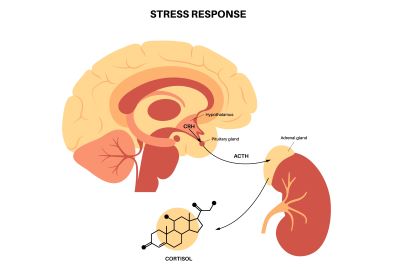 Stress – especially negative stress – also promotes inflammation and increased blood pressure, both of which in turn promote the development of arteriosclerosis. However, it is possible to take countermeasures. For example, an effective reduction in stress hormone levels can be achieved through the conscious reduction of individual stress factors, compensatory measures such as relaxation techniques or moderate sport. Sport can also improve the LDL/HDL ratio and therefore has a doubly positive effect! Valuable support for improving resistance to stress and increasing stress resistance is also provided by various vital mushrooms. Cordyceps, Hericium and Reishi are particularly worth mentioning here.
Stress – especially negative stress – also promotes inflammation and increased blood pressure, both of which in turn promote the development of arteriosclerosis. However, it is possible to take countermeasures. For example, an effective reduction in stress hormone levels can be achieved through the conscious reduction of individual stress factors, compensatory measures such as relaxation techniques or moderate sport. Sport can also improve the LDL/HDL ratio and therefore has a doubly positive effect! Valuable support for improving resistance to stress and increasing stress resistance is also provided by various vital mushrooms. Cordyceps, Hericium and Reishi are particularly worth mentioning here.
The most important vital mushrooms for elevated cholesterol levels
In general, mushrooms are an important nutritional component both in prophylaxis and as a measure against elevated cholesterol levels. When selecting the therapeutically appropriate vital mushrooms, the individual causes such as arteriosclerosis, overweight or stress should always be considered first. More decisive than the total cholesterol level is often the LDL value, the amount of harmful oxidised LDL, or the ratio of LDL to HDL. This ratio, the so-called LDL/HDL quotient, should be below 3, or rather below 2.5 for high-risk patients. This again shows that it is not simply about lowering cholesterol levels, but about measures that positively influence the healthy function of the liver and overall health.
Shiitake
With shiitake, mycotherapy 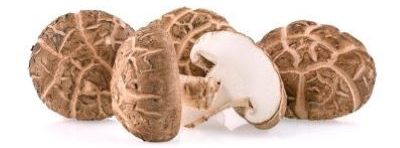 offer an excellently effective vital mushroom for patients with elevated cholesterol levels. This mushroom supports liver health and counteracts the risk factor of arteriosclerosis.
offer an excellently effective vital mushroom for patients with elevated cholesterol levels. This mushroom supports liver health and counteracts the risk factor of arteriosclerosis.
Auricularia
The vital mushroom Auricularia also has cholesterol-lowering properties and is also a very good complement to shiitake with regard to arterial health. It has a relaxing and dilating effect on the blood vessels and can therefore also be an effective aid in cases of high blood pressure. Furthermore, Auricularia hinders the formation of clots and supports microcirculation.
Reishi
The vital mushroom Reishi is of 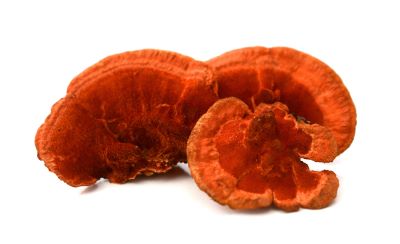 great importance for liver health and is also an important therapeutic support for non-alcoholic fatty liver. Reishi can be used for all cardiovascular diseases and also improves the oxygen supply to the heart and tissues. Furthermore, it acts against inflammation and oxidative stress and thus against two significant causes of high cholesterol levels. Its use has also proven effective when harmful oxidised cholesterol is present.
great importance for liver health and is also an important therapeutic support for non-alcoholic fatty liver. Reishi can be used for all cardiovascular diseases and also improves the oxygen supply to the heart and tissues. Furthermore, it acts against inflammation and oxidative stress and thus against two significant causes of high cholesterol levels. Its use has also proven effective when harmful oxidised cholesterol is present.
Pleurotus
Numerous vital mushrooms can target cholesterol production, promote cholesterol excretion and impede the absorption of cholesterol from the intestine. One of these mushrooms is Pleurotus. Additional plus: This vital mushroom also promotes healthy intestinal flora, which can also have a positive influence on cholesterol metabolism.
Maitake
The vital mushroom maitake 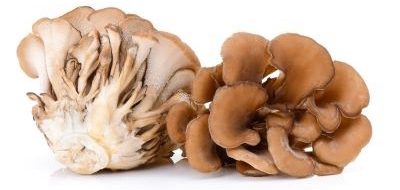 can be used very well as a supplement to reishi in the treatment of fatty liver. It has also proven effective in metabolic syndrome, helps to lose weight in the abdominal area and has a lowering effect on blood lipid levels. If insulin resistance causes the HDL to drop, Maitake and the vital mushroom Coprinus can be used to counteract this.
can be used very well as a supplement to reishi in the treatment of fatty liver. It has also proven effective in metabolic syndrome, helps to lose weight in the abdominal area and has a lowering effect on blood lipid levels. If insulin resistance causes the HDL to drop, Maitake and the vital mushroom Coprinus can be used to counteract this.
Where can I buy medicinal mushrooms?
There are countless suppliers from all over the world on the internet. However, we strongly recommend paying attention to important quality criteria. Since mushrooms absorb all kinds of toxins, they must not come into contact with any chemical fertilisers, pesticides or similar! The most important quality criterion is therefore organic cultivation. Since the strictest guidelines for this are applied in Germany, you should only choose vital mushrooms that have been cultivated in Germany. In addition, the powder should be made from the whole mushroom so that the highly effective ingredients of all components of the mushroom are completely contained. To ensure effectiveness, the mushroom powder must also not have been dried at more than 40° Celsius. Since loose powder can quickly become mouldy without this being visible from the outside, capsules filled with mushroom powder are always the first choice!
Please consult your therapist before use!






